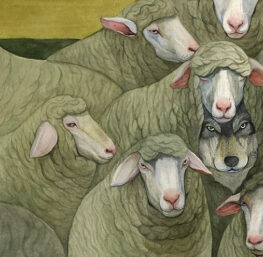
5/7/2010 – Jacob Hornberger –
Liberals say that they love the poor, needy, and disadvantaged. Unfortunately, however, the economic philosophy that liberals favor constitutes a direct assault on the economic well-being of the poor, along with nearly everyone else in society.
Liberals claim to combat poverty in two principal ways.
First, they use the force of government (e.g., income taxes) to take money from those who have earned it in order to give it to the poor.
Second, they restrict people’s use of their property to enable the poor to have access to such property.
What liberals fail to understand, however, is that the very means they choose to combat poverty — socialism and interventionism — actually exacerbate the problem that they claim to address. Their war on poverty hurts the very people they say they are trying to assist.
In proposing welfare-state programs, by necessity liberals always make an important assumption. They assume that there is wealth in society. After all, if there is no wealth then what good would welfare-state policies do? The welfare state operates on the assumption that there are people who are earning wealth or have accumulated wealth. Those are the people from whom the government takes money in order to redistribute it to the poor.
Let’s consider a hypothetical case based on science fiction. Astronomers discover that an inhabitable planet is hurtling toward our solar system and will soon join the other planets in orbit around the sun. Faced with overcrowding of its prisons, the federal government decides to exile 50,000 prisoners on a spaceship to the planet. Everyone is given six months of supplies on which to survive — food, water, and clothing — and nothing else.
When the prisoners arrive on the planet, they call into existence a federal government, democratically elected. Federal officials are empowered to do everything and anything they can to combat the extreme poverty that is immediately facing society.
Liberals are elected to the presidency and to Congress. They propose a massive welfare-state program modeled on Franklin Roosevelt’s New Deal and Lyndon Johnson’s Great Society. Social Security. Medicare and Medicaid. Public housing. Food stamps. Grants to education. Agricultural subsidies. Unemployment relief.
Do you see the problem? The federal government isn’t a fountain of wealth. It has no money. Its coffers are empty. In order to get the money to distribute all these welfare benefits to people, it must first impose a tax on people.
But do you see the next problem? There are no wealthy or even middle-class people who can be taxed because everyone in this society is poor.
In proposing their array of welfare programs to help the poor, liberals operate under the mindless assumption that wealth exists naturally in a society. Even worse, they give nary a thought to the possibility that a society in which wealth is growing is the greatest benefit to the poor. Worst of all, they don’t consider the distinct possibility that their own tax-and-redistribute policies tend toward destroying the base of wealth in society, thereby relegating everyone to poverty.
Let’s return to our hypothetical example regarding the prisoners on the new planet. Everyone is poor. Welfare-state policies to combat the poverty will obviously not work because there are no wealthy people to take money from in order to redistribute it to the poor. So what can be done to combat poverty?
Ownership, collective and private
The liberals come up with a novel solution. They adopt a system by which the government owns everything and by which everyone works for the government. People will be assigned houses to build, businesses to run, or places in fields to grow crops. Government officials will be in charge of planning everything — which crops will be planted, which occupations people will be assigned to, which houses will be built, which consumer goods will be produced. Central planners will distribute food, housing, clothing, and other essentials in accordance with the needs of each person and each family.
Everyone seems happy with the scheme, especially since it mirrors much of the prison life to which the prisoners had been accustomed. But a problem arises, one involving human nature. No one feels like working very hard. Agricultural workers are constantly getting sick. People are doing jobs for which they are ill-suited. Goods and services are scarce, and the situation is getting worse for everyone.
Actually, this hypothetical society isn’t far from reality. It is pretty much what happened when the first colonists arrived at Plymouth Rock. They formed a society in which most property would be collectively owned and shared.
The result? Starvation and famine.
One day, Governor Bradford changed the system. From that day forward, everyone would be entitled to own his own property and keep the fruits of his labor for himself and his family. No longer would people be forced to share their earnings with others.
Immediately, everyone began working harder and accumulating wealth. No more starvation and famine. The bounty produced by this private-property system formed the foundation for the first Thanksgiving.
What would be the solution to poverty in our hypothetical example? It would a libertarian one, a solution based on private property and free markets. Everyone would be free to go into any business he chose. In that way, people could pursue their own interests and talents in an attempt to provide goods or services that other people would be interested in purchasing.
People would be free to engage in any economic trade with anyone else, without interference or regulation by the government.
People would also be free to accumulate the fruits of their earnings. There would be no income tax imposed on the people.
Obviously, at first there would still be manifest poverty, given the difficulties in accumulating wealth. People struggling to survive have a difficult time saving any money. But by the time of the second generation, things will have improved a bit, with families actually accumulating savings that they would then be free to pass down to the third generation.
Within a few decades, such a system of free enterprise would not only generate millionaires but also raise the standard of living for those at the bottom of the economic ladder. Equally important, the poor would know that they had a chance to join the ranks of the middle class and wealthy simply by working hard and providing a product or service that other people were willing to pay for.
This, too, is not as hypothetical as it sounds, as it pretty much describes the situation in the United States after the adoption of the Constitution in 1787 and continuing through the early 1900s. For the first time in history, people were able to engage in enterprise freely (that is, without government regulation or control) and accumulate unlimited amounts of wealth (that is, without their incomes’ being taxed).
That’s not to say, however, that the process of wealth creation was an immediate one. For the first few decades, life was very difficult, as it would be in any society in which there exists only a small base of wealth.
Liberals often point to the Industrial Revolution as an example of the horrors of the free-market system. Factory conditions, for example, were horrific for those working there, including wives and children, as liberals are so fond in reminding us.
But liberals miss an important point. Those factories, as bad as they were, offered a chance for survival to those who were working in them. A society in which there is no foundation of wealth and no chance of accumulating wealth will inevitably have people starving to death.
A society in which there is limited wealth but in which people are free to engage in enterprise and accumulate wealth will inevitably have people struggling to survive but at least having a chance to survive.
That’s what was occurring during the Industrial Revolution. American husbands and fathers were sending their wives and children into factories not because they hated them but because they knew that that was the only chance they had to keep them alive.
Then, as families began accumulating wealth, the need to send the entire family into the factories became less desperate. It was not government but rather capital — the accumulation of savings — that ultimately brought wives and children out of the factories.
The key, then, to a rising standard of living in a society lies in savings and capital. Let’s examine how this is so. […]



